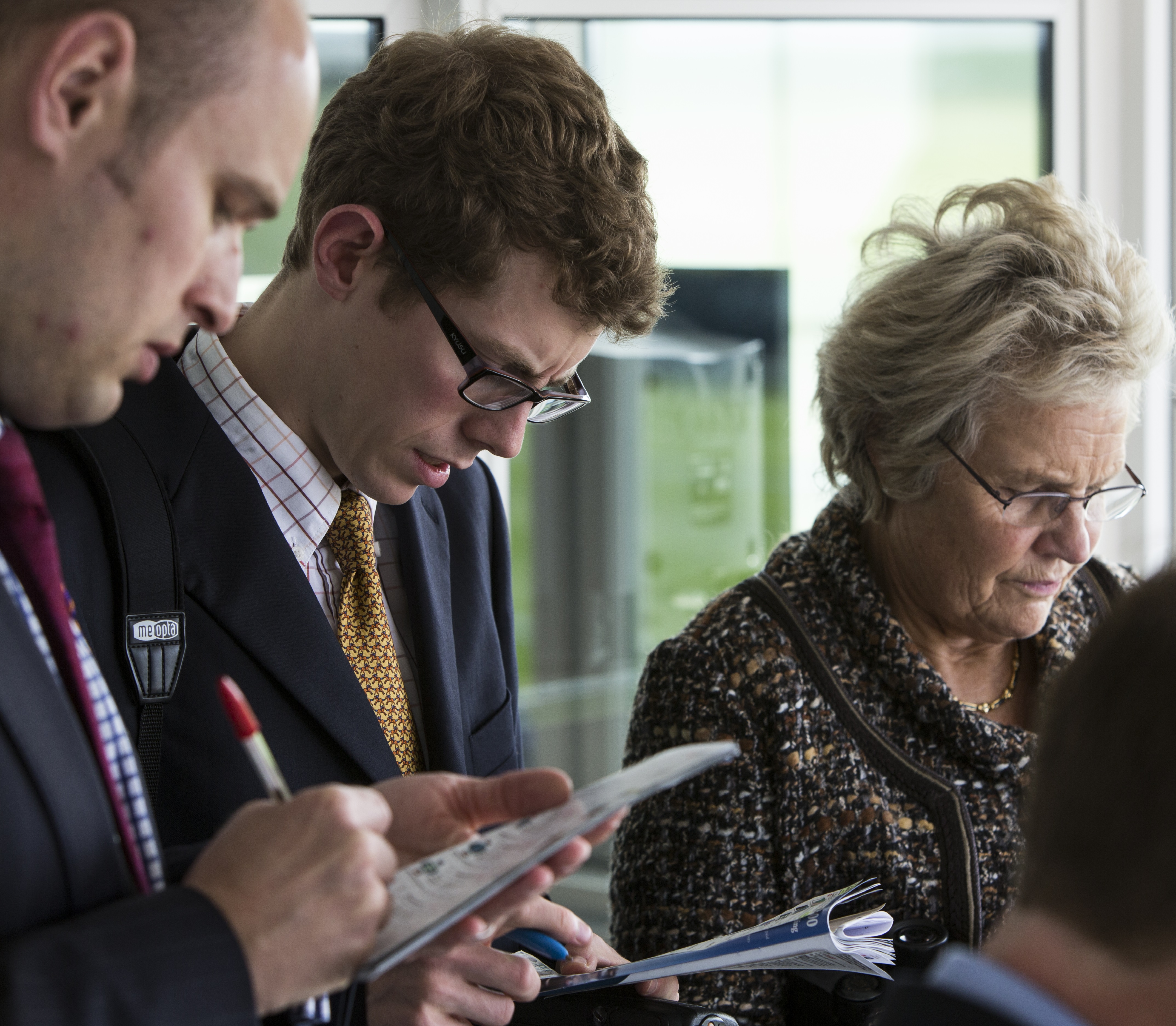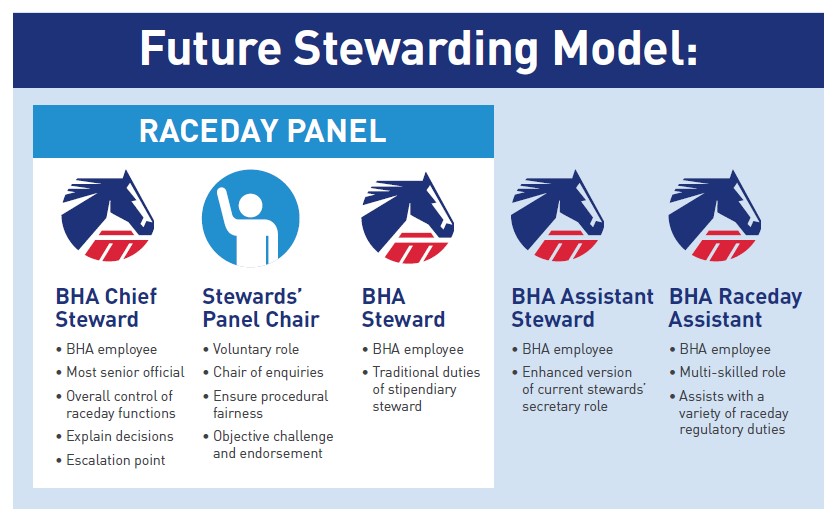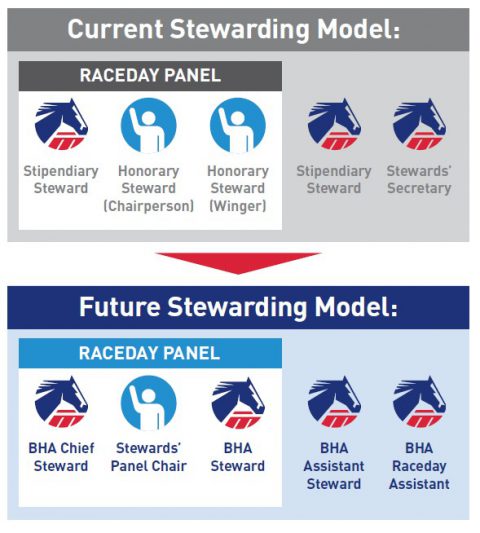
- New model to be introduced in 2019 as a result of extensive consultation
- Combines best elements of current system with a new approach to improve standards of officiating, increase consistency, transparency and accountability and to bring British racing in to line with our sporting bodies and other racing jurisdictions
- “One team” approach will ensure consistent standards and expertise amongst all officials
British horseracing’s officiating model will evolve in 2019, to raise the bar on how the sport is regulated and how it handles integrity, safety, welfare and the management of risk on the racecourse.
This is the result of an extensive consultation process and review of the sport’s stewarding model which commenced in summer 2017.
The new officiating model is intended to improve standards of officiating, increase consistency, transparency and accountability and to bring British racing in to line with our sporting bodies and other racing jurisdictions, while also respecting and utilising the history, tradition and significant expertise of the current model.
The new structure revolves around the approach that raceday officiating should work as “one team” with consistent standards, expertise and professional development, while retaining the ability for objective challenge and endorsement of decisions.
Key features of the new model are:
- “One team” approach – a programme of professional development of stewarding expertise amongst both new and existing stewards (both BHA and volunteer stewards)
- The introduction of a new “Chief Steward” role. This will be a professional BHA employee which has overall control of raceday functions and will provide clear accountability and an escalation point for raceday decisions
- Voluntary stewards to fulfil the role of “Stewards’ Panel Chair” with responsibility for chairing stewards enquiries and ensuring procedural fairness
- Addition of a multi-skilled “BHA Raceday Assistant” to ensure that the stewarding team is better joined up with other raceday functions

Brant Dunshea, Chief Regulatory Officer for the BHA, said:
“Horseracing is a major British sport, with a proud history, a global reach and with aspirations of continuing growth. It has always evolved with the times, keeping pace with wider social, political, economic and technological changes.
“Now, as always, we face a number of challenges. Not only are we facing increased competition from other sports for support, publicity, sponsorship and investment, we are also at continuous risk from unscrupulous interests who seek to exploit and corrupt the sport for financial gain.
“The framework of raceday regulation currently in place in Britain has served us well. However, to ensure that Racing is best positioned to mitigate and manage the risks posed by contemporary integrity threats to so many sports, it’s essential that we continue to evolve and improve our regulatory systems.
“We believe that the new officiating model retains the best elements of the current model, while raising the bar on integrity, welfare and the management of risk and major incidents. We expect this to bring together all our raceday teams, including our volunteer and professional stewards and other officials, into a more coherent, supportive, consistent, flexible and effective operation.
“Threats and challenges are always best addressed by working as a team, and this ‘one team’ concept is central to the development of the new model we will be establishing.”
The new raceday regulatory system has evolved from an extensive programme of consultation with the sport’s stakeholders, participants and fans. 128 responses were received, with a strong sentiment being that change is required.
As a result of this consultation, a series of core principles and objectives were developed, to inform the design of any new stewarding model. Five different proposals were developed and were discussed with both the Stewarding Committee and a group of Honorary Stewards, as well as with the Stipendiary Stewards and Stewards’ Secretaries. The five proposals were then presented to the BHA Board at their June 2018 meeting, where the decision was made to adopt the chosen model.
Andrew Merriam, Independent Regulatory Director on the BHA Board, said:
“This has been an exceptionally thorough and collaborative process. I would like to thank everyone who participated in this consultation. The responses we received were frank and constructive and clearly supported the need to evolve our raceday officiating system.
“The BHA Board is confident that the chosen approach will make the sport better placed to tackle risk and ensure the confidence of the sport’s fans, followers, investors and participants and ensure that we continue to retain our status as a treasured British institution.”
NOTES TO EDITORS
1. A Q&A document regarding the announcement can be found here: Stewarding Review Q and A.
2. You can watch Brant Dunshea being interviewed about the announcement here.
3. Next steps
The new model involves significant changes and it is important that we take appropriate care, to make the transition as smooth and effective as possible.
Consequently, we will need to work with key stakeholders on the detail of the implementation plan, particularly as it will involve changes to some roles and responsibilities. This will take time to work through.
However, we remain committed to testing the new model during the Autumn of 2018 at a mix of turf and All Weather fixtures, with a view to full introduction across all British racecourses in the first quarter of 2019.
4. Volunteer stewards
All Honorary Stewards will be invited to send an ‘expression of interest’ before the end of September if they wish to continue in a stewarding role.
Of those who put their names forward, in 2019 those qualified as Chairmen under the current system will be eligible to carry on as the Stewards Panel Chair volunteer role on the panel during the transition. Those that are currently only qualified to sit as ‘wingers’ can attend fixtures as an observer and express their interest to go through the application/assessment process and necessary training to become a Stewards’ Panel Chair.
What the assessment process consists of will not be decided until we have discussed it with representatives from those who wish to be part of the new Stewarding Team.
When we have gone through this process with the existing volunteer members we will then assess where there is any need for more resourcing and open an application process. We will likely look at this on a regional basis.
5. Costs
The overall proposed cost of the new system will be £330k. This additional cost covers the cost of recruiting and retaining new roles and additional training costs for new and existing staff and voluntary stewards.
These costs will be met as part of the BHA’s overall regulatory costs.
6. The five core principles of the stewarding model
- Streamlined raceday management
- An efficient and legally sound stewarding model
- Enhanced training and management of the stewarding team
- Supporting the disciplinary and integrity functions within British racing
- Meeting sports governance standards
7. Comparison of old model to new model

